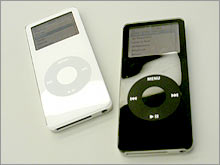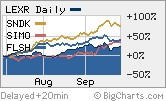 |
| The launch of Apple's new iPod nano, which uses flash memory instead of a hard drive for storage, has helped boost the stocks of flash memory companies. |
|
 |
| Flash forward: Shares of flash memory companies Lexar, SanDisk, Silicon Motion and M-Systems are on fire lately. |
|
|
|
|
|
|
|
| More about consumer electronics
|
|
|
|
|
NEW YORK (CNN/Money) – Comic book super hero The Flash was known for his ability to get from one place to another with amazing speed.
And on Wall Street lately, shares of companies that make flash memory storage devices, such as little cards that can be inserted into MP3 players, digital cameras and cell phones, are also getting a reputation for moving very quickly.
In just the past three months, industry leader SanDisk's (Research) stock has shot up more than 80 percent. Shares of smaller companies Lexar Media (Research), M-Systems Flash Disk Pioneers (Research) and newly public Silicon Motion Technology (Research) are up an average of 35 percent during the same time frame.
Analysts say strong demand for consumer electronics gadgets has fueled the surge. But the stocks have also received a boost recently from Apple (Research), which unveiled its sleek iPod nano earlier this month. That music player uses flash memory to store music and photos, not the hard drive used in most other iPods.
An iPod halo for flash?
And even though Korean tech giant Samsung was chosen as the supplier of flash memory for the iPod nano, the introduction of this flash-based player was seen as a good sign for the whole industry for two key reasons.
It helped to further legitimize flash memory as an alternative to hard drives, which tend to have more storage capacity. And it also helped ease concerns about a possible glut of flash products, which could lead to a big drop in prices for flash chips.
"The iPod nano raises awareness of flash. And the other thing that is important is that there is only so much flash capacity out there. The market for flash is expanding faster than it can be produced, so pricing has declined less rapidly," said Michael Mahoney, managing director with EGM Capital, a San Francisco-based hedge fund.
EGM owns shares of SanDisk and M-Systems, which is known for its DiskOnKey, a flash memory drive that plugs into a USB port and allows for the storage and transfer of digital data files.
The iPod nano will also help to directly boost the fortunes of SanDisk, said Eric Ross, an analyst with ThinkEquity Partners. That's because Samsung pays royalties to SanDisk for use of multi-level cell (MLC) flash, a technology that SanDisk holds patents on.
Ross conservatively estimates that SanDisk will generate about $290 million in revenue from royalty payments from Samsung and other companies in 2006. That's more than 10 percent of the company's estimated 2006 revenue. (He doesn't own the stock and his firm has no banking relationship with the company.)
But if the iPod nano is a big hit, he said royalty revenue could easily hit $350 million. And since this revenue flows right down to the bottom line, Ross said an increase in royalty payments could boost earnings substantially.
New markets and cheap stocks are flashy
Still, can flash stocks keep rising? Mahoney thinks that the two flash stocks his fund owns will continue to benefit from healthy sales of digital media products.
"Flash is putting storage in places where you hadn't had it before. There are more and more applications and new iterations allow flash to have more content," he said.
To that end, SanDisk made a bold strategic move earlier this week.
The company has primarily been known for selling empty flash cards in retail outlets. But on Tuesday, SanDisk unveiled a new product called TrustedFlash, cards that can be pre-loaded with content like movies or music that users can transfer among mobile devices such as laptop computers, cell phones and personal digital assistants.
SanDisk's first such product will be a special release of the latest album by The Rolling Stones. The card carries a steep price of $39.95.
Pedro Vargas, director of mobile entertainment for SanDisk, said that the high price is justified by extra content, such as the ability to preview many of the band's older songs, and that its cards are not meant to be a replacement for the compact disc format or digital downloads.
"This is an affinity product so there will be premium pricing," Vargas said.
Still, Ross thinks the new cards could be a success especially since cell phones are increasingly becoming an all-in-one multimedia device for many consumers. "More people are using cell phones as more than just a phone," he said.
And valuations for most flash companies, despite their big run-ups, still remain reasonable. The sole exception is Lexar, which is more of a turnaround story. It lost money last year, is expected to do so again this year and trades at more than 100 times 2006 earnings estimates.
But SanDisk trades at only 23 times 2006 earnings estimates, in line with its expected growth rate of 23 percent next year and 20 percent rate annually, on average, for the next five years. It's even cheaper when you consider that the company has the equivalent of $8 per share in cash, said Mark Mowrey, senior analyst with Al Frank Asset Management, which owns SanDisk in the Al Frank fund.
"We have not sold any of our SanDisk even though it's gotten significantly more expensive. It has a great balance sheet," Mowrey said.
M-Systems sports a P/E of 20 based on next year's profit projections and analysts expect earnings to increase at a 25 percent clip for the next few years. And Taiwan-based Silicon Motion, which went public in late June and makes flash cards and USB flash drives, trades for just 17 times 2006 earnings estimates despite a long-term growth forecast of 35 percent.
At those multiples, these stocks don't look like they'll be a flash in the pan.
Scratch that iPod nano? Click here.
For more about personal technology, click here.
Sign up to receive the Tech Biz column by e-mail.
Plus, see more tech commentary and get the latest tech news.

|